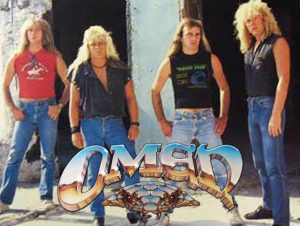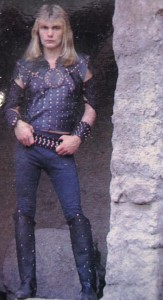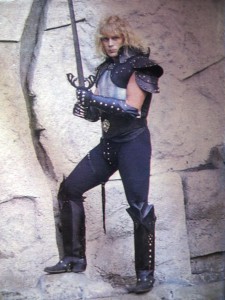
Formed in 1983 by guitarist Kenny Powell, Omen were part of a thriving scene that included the likes of Fates Warning, Jag Panzer, Helstar, Shok Paris, Virgin Steele, Liege Lord and Queensrÿche. Dubbed power metal years before it became a term of abuse, these outfits played a muscular, aggressive style far removed from the AOR and glam which dominated America at the time. Influenced by British bands and the culture of old Europe, Omen’s epic tales of sword and sorcery never brought them major success, but in terms of kudos, respect and sheer cult worship, they’re as good as Gods.
Like many bands of their era, Omen lost their way as the years rolled by and fashions came and went. More than once they tried – and failed – to change with the times. But it takes more than a couple of dodgy albums to wipe out the golden legacy of their early days and in 2013 – thanks in no small part to the Internet and a few thousand Greeks – Omen’s popularity is at an all-time high.
Currently hard at work on a brand new album, guitarist Kenny told Greg Moffitt about the highs, the lows and the lessons learned…
How did your career in heavy metal begin and what were your early influences?
“I grew up in the dusty plains of Oklahoma and there wasn’t a lot of great music around there! I knew a few people who were into metal, or what was becoming metal, AC/DC, Iron Maiden and stuff like that. I was always a big Thin Lizzy fan, with the harmony guitars. I was into racing cars for a while and got into guitar playing pretty late; I was 24. But it took off and I ended up taking a couple of guys I was playing with and moved to LA. Steve, the original drummer I played with, had gone to LA and come back and said ‘Wow! Bands play only their own songs there!’ I hated playing cover tunes with a passion so I decided that’s where I wanted to go.”
The LA scene was really hot and happening back then. You had the likes of Slayer and Megadeth starting out, W.A.S.P. and Dokken breaking through, and of course the glam scene with Mötley Crüe, Quiet Riot and Ratt. What was it like actually being there?
“It was really exciting and a complete change from what I was used to. It was a happening scene; you could go out every night and watch cool bands playing. Mötley Crüe had kinda moved out of the club scene by the time I got there but I saw Ratt a couple of times and was very unimpressed! When we started playing the clubs, we had a flyer which said ‘Tired of seeing bands that are better looking than your girlfriend?’”
 You were briefly a member of Savage Grace and played on their 1983 EP ‘The Dominatress’. How come you didn’t stay with them for longer?
You were briefly a member of Savage Grace and played on their 1983 EP ‘The Dominatress’. How come you didn’t stay with them for longer?
“Like I said, I went to LA with a couple of other guys and the intent was always to form my own band and do my own thing. But we were having a tough time finding a singer that I thought was worthy and in the meantime I’d become pretty good friends with Brian East from Savage Grace who ended up asking me to join. So, I committed to doing a couple of records with them, but always with the thought that I would go on and do my own thing when I could find the right people. It was a good opportunity, I learned a lot and I met a lot of people through that. I didn’t have a lot of music business experience up to that point, so I had no regrets about it, but it came to the point where I was writing a lot of material that was not fitting in and wasn’t being accepted. Then I met [vocalist] JD Kimball, who was working on a garage band, just rehearsing. I went to see him and I was like ‘Shit! He’s my guy!’ So it was time to move on. But we toured with Savage Grace last time we were in Europe, which was fun, although [guitarist] Chris [Logue] is the only original guy left. I got up on stage with him a couple of times and all in all it was a good experience for both of us.”
One of the people you met through Savage Grace was Brian Slagel, which ultimately led to your deal with Metal Blade and the release of ‘Battle Cry’ in 1984.
“I became personal friends with Brian – we’d go to concerts and sporting events together – and he’d said ‘You get a band together and you’ve gotta deal’, so that worked pretty smooth. I think ‘Battle Cry’ has held up really well. I was very satisfied with it at the time, particularly as it was a very small recording budget. They’re just good songs, and any time we play any of them live, we don’t even have to sing! That’s a pretty good feeling after all these years.”
Omen seemed to be more influenced by European bands than a lot of the LA scene at that time; bands like Priest, Saxon and Iron Maiden, who you’re often compared to.
“I’d be lying if I said I didn’t like Maiden, but I think a lot of that comes from the harmony guitars; the vocals are obviously very different. But it’s no disgrace to say you’re similar to Maiden, and I wouldn’t mind some of their money!”
Although thrash and glam were really starting to dominate the scene by 1985, you released a very strong, stick-to-your-guns second album in ‘Warning Of Danger’.
“It was a really good step forward and I’m very proud of that record, especially as you get your whole life to write your first album and a year to write your second. It’s a little bit tighter and better produced. It was the big album for us in South America and when we go there everyone knows all the songs. It’s like ‘Battle Cry’ is for us in Europe.”
For your third album ‘The Curse’ you managed to secure a major distribution deal but it didn’t lead to the kind of breakthrough you might have hoped for.
“’The Curse’ is probably my favourite Omen album, it’s still catchy but also a little more musical, and it was the first time we had a little money to spend in the studio. We were getting good reviews and starting to get on some major tours, but some people have difficulty with saying they want success and then getting afraid when it starts coming. I feel that kinda happened with JD. He got out of control and ended up in jail. I was like ‘We worked really hard for this, so you need to think about what you’re doing’. I never heard from him again. It unravelled at that point and it was really sad ‘cause the record far outsold anything we’d done. If we’d kept touring and pushing it, I think it coulda been pretty darn successful. It was heart-breaking for me.”
You decided to alter the band’s image around this time, changing out of battle gear and into jeans and t-shirts.
“I’d love to put the battle gear on again someday, but here’s what happened with that; when the thrash thing started getting bigger, we started getting ‘You guys look like Mötley Crüe!’ We didn’t wanna get compared to that, so we just decided to take it off. The thrash crowd didn’t seem to enjoy it. I like Slayer, but we opened for Slayer and the crowd wasn’t interested in traditional metal. People in Europe are really into the whole warrior thing, but it didn’t really catch on here. I wish to hell we could have gone to Europe back then!”
You replaced JD with ex-Prisoner and subsequent Annihilator frontman Coburn Pharr for ‘Escape To Nowhere’, which was a pretty radical departure from the classic Omen sound. Was this a mistake?
“I never want this to come across the wrong way, but this was the first time we’d really used a producer, and I loved the stuff he [Paul O’Neill] had done with Savatage, but we came in with an entire record and every song was dismissed. It was not a great experience for me. I fought through it but it wasn’t the right thing for Omen. I was really unhappy with the album, although it did really well in the US, being a bit more commercial. We were on the radio and in the Top 40 for a few months, but I didn’t enjoy the music or the process. We should have done the record we planned to do. Coburn got blamed for a lot of that stuff, but it really wasn’t anything to do with him.”
Was ‘Escape To Nowhere’ the reason the band broke up?
“It didn’t have to come to an end, but I was really despondent about the music and the line-up. I decided it was best just to put it to bed. I thought maybe I’d write songs or produce, but that didn’t last too long either. So, I started working at a guitar centre close to my family back in Oklahoma and it was a long time before I thought about doing Omen again.”
When you did eventually release a new album – 1997’s ‘Reopening The Gates’ – it was pretty much as far from the traditional Omen sound as ‘Escape To Nowhere’. Once again, it seemed to be chasing the latest trend.
“That was the record from hell. At that stage, I had no idea about the European fan base for Omen and I didn’t really wanna be a dinosaur. My son came into the band and he was into a lot of the newer metal and it just kinda evolved into something it shouldn’t have been. It didn’t take long to realise it was a mistake, but you can’t take those things back. You just have to live with them and move on. So I came home and started writing the songs for ‘Eternal Black Dawn’.”
‘Eternal Black Dawn’ – which came out in 2003 – isn’t classic Omen, but it was certainly a step in the right direction.
“It was the first stepping stone back to where I wanted to go. It’s not Battle Cry, but it’s closer to Omen than the previous two.”
 JD sadly succumbed to cancer in 2003. Were you aware that he was ill?
JD sadly succumbed to cancer in 2003. Were you aware that he was ill?
“No, I knew nothing. All I knew was that nobody knew where he was. I had looked for him a couple of years before that, but he’d just dropped off the face of the Earth. It’s sad, ‘cause I’d love to have done more music with him. If I’d known he was ill, I would have tried harder. It’s sad that he never got to go to Europe and see how respected Omen is there.”
The metal landscape has shifted considerably during the last decade or so, creating a welcoming space for classic bands of the ’80s and providing fertile ground for the new breed of bands with an old-school sound.
“I never wanted this to be just about nostalgia, but it’s really cool. It’s really rewarding to see so many kids into classic metal. A lot of the metal around now with barking vocals and no melody, I can’t tell one song from another. Good songs don’t fade away and I thought our stuff was good when we did it – thought it shoulda been way bigger than it was – but it’s good that it’s been an influence and that means a lot more to me than money.”
As a veteran in the business, what’s your general take on comebacks and reunions?
“I didn’t put a version of Omen together for a ‘comeback’ because I didn’t really expect much to happen with it. I just really missed playing live, but I had no idea how it would be received; I didn’t have a clue whether people would be into it. Doing it because you think it’s popular right now, I’m not so sure, but if you do a comeback because you’re really into the music, that’s great. I hope my last day is spent playing ‘Battle Cry’ somewhere!”
Some bands make better comebacks than others, but one common criticism of smaller bands reuniting – cult bands such as Omen – is that they’re ‘only doing it for the money’, as if they’re Led Zeppelin or something.
“[Laughs] Right! I mean, never mind the ’80s, I’m pretty much starving to death right now. If it wasn’t for my wife being so supportive, I couldn’t do this at all.”
You’re working on a new Omen album entitled ‘Hammer Damage’, named in honour of JD’s original garage band. How’s that coming along?
“It’s the closest thing to the early albums that I’ve ever done. One of the things that was contingent with the last line-up of Omen; not everyone wanted to do a new album and I’m like ‘If you don’t wanna do a new record, I need to move forward with somebody else’. I still wanna contribute because I still think I have something to contribute, and ten years from now might be too late. I’ve put everything I have into this new record; my home studio’s been wiped out twice by storms during recording and insurance didn’t cover it, so it’s been a real struggle. I’m doing everything myself, so it takes a long time, but I’m very close to doing the final mixes. I actually had a version of this recorded with the previous line-up, but I wasn’t really happy with it so I just started again. I compromised in the past and I didn’t wanna compromise on this record. If it fails miserably, then it’s on my shoulders, but I think it’s gonna be worth all the hell I’ve been through.”
What keeps you going?
“I’m a few years away from being 60 years old and it’s the fans that keep me going; they’re phenomenal! I’ve made friends all around the world and in fact I have more friends elsewhere than I do where I live. It’s really rewarding to create something, wonder why it wasn’t received better and then go to overseas and it’s like ‘Whoa! Why the hell didn’t we play here in the heyday?!’ Things coulda been a lot different. And I love playing live. There’s nothing like it, and there are times I feel like I’m almost out-of-body. The feeling you get after doing a show, if only you could bottle that as a drug!”
Omen was originally featured in Iron Fist #3
Copyright © 2024 Iron Fist Magazine. All Rights Reserved.